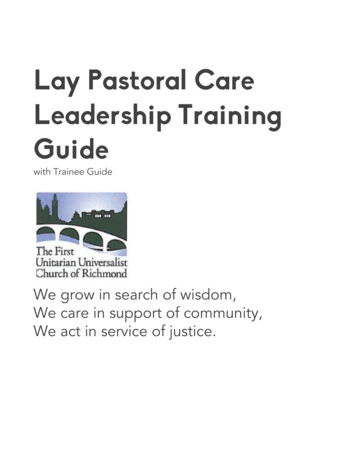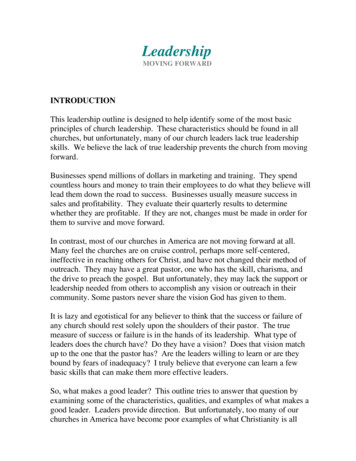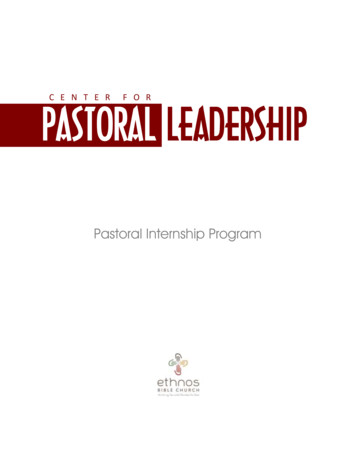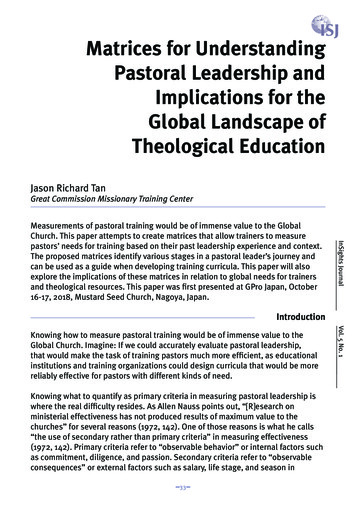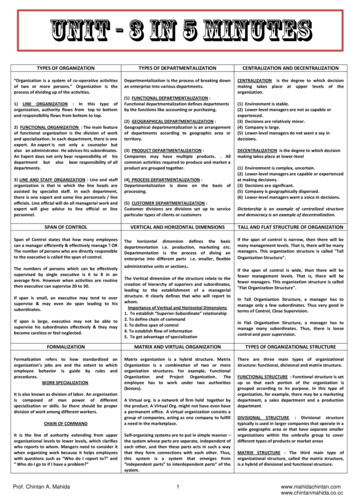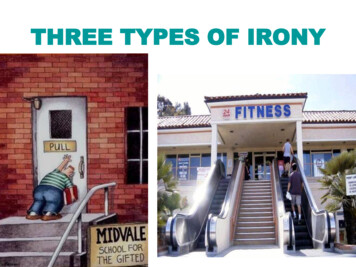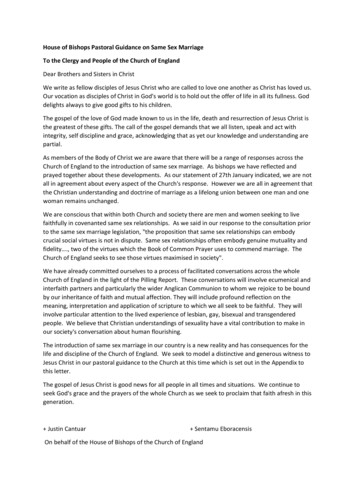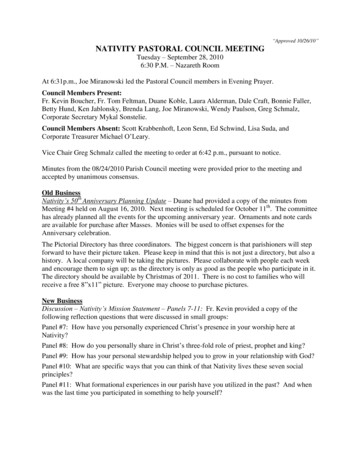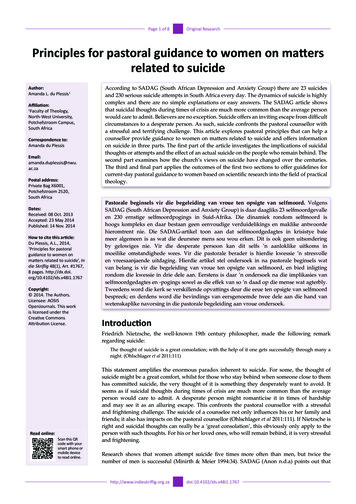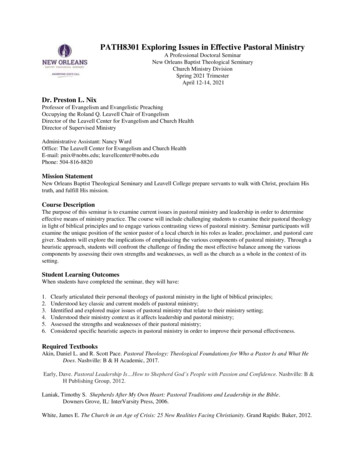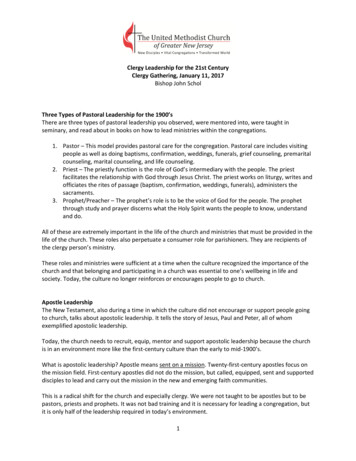
Transcription
Clergy Leadership for the 21st CenturyClergy Gathering, January 11, 2017Bishop John ScholThree Types of Pastoral Leadership for the 1900’sThere are three types of pastoral leadership you observed, were mentored into, were taught inseminary, and read about in books on how to lead ministries within the congregations.1. Pastor – This model provides pastoral care for the congregation. Pastoral care includes visitingpeople as well as doing baptisms, confirmation, weddings, funerals, grief counseling, premaritalcounseling, marital counseling, and life counseling.2. Priest – The priestly function is the role of God’s intermediary with the people. The priestfacilitates the relationship with God through Jesus Christ. The priest works on liturgy, writes andofficiates the rites of passage (baptism, confirmation, weddings, funerals), administers thesacraments.3. Prophet/Preacher – The prophet’s role is to be the voice of God for the people. The prophetthrough study and prayer discerns what the Holy Spirit wants the people to know, understandand do.All of these are extremely important in the life of the church and ministries that must be provided in thelife of the church. These roles also perpetuate a consumer role for parishioners. They are recipients ofthe clergy person’s ministry.These roles and ministries were sufficient at a time when the culture recognized the importance of thechurch and that belonging and participating in a church was essential to one’s wellbeing in life andsociety. Today, the culture no longer reinforces or encourages people to go to church.Apostle LeadershipThe New Testament, also during a time in which the culture did not encourage or support people goingto church, talks about apostolic leadership. It tells the story of Jesus, Paul and Peter, all of whomexemplified apostolic leadership.Today, the church needs to recruit, equip, mentor and support apostolic leadership because the churchis in an environment more like the first-century culture than the early to mid-1900’s.What is apostolic leadership? Apostle means sent on a mission. Twenty-first-century apostles focus onthe mission field. First-century apostles did not do the mission, but called, equipped, sent and supporteddisciples to lead and carry out the mission in the new and emerging faith communities.This is a radical shift for the church and especially clergy. We were not taught to be apostles but to bepastors, priests and prophets. It was not bad training and it is necessary for leading a congregation, butit is only half of the leadership required in today’s environment.1
What is Apostolic LeadershipWhat does apostolic leadership look like? Attributes of today’s apostles can be understood throughthree characteristics – the spirit, skills and attitude of apostles.Spirit of Apostles - Risk taker, Innovator, Courageous, Collaborator, and Creative problem solver.Apostles have a unique spirit.Skills of Apostles – Builder, Developer, Explorer, and Organizer. Apostles create something that growsthe mission and people.Attitude of Apostles – Encourager, Investor, Leader of leaders and Coach. Apostles see everyone as apotential leader and pour themselves into the development of people.Apostles inspire people, create a bigger mission, develop people, and organize the church to accomplishthe mission.Pastors, were you mentored by your home pastor to lead like this? Was half of your seminary trainingteaching you to lead like this? Did the Board of Ordained Ministry expect you to lead like this? Did theGNJ RIM mentorship program mentor you to lead like this? Does your district superintendent challenge,hold you accountable and support you to lead like this? Did your bishop ordain, consecrate or licenseyou to lead like this?Apostles Integrate the message with daily Kindom living. Provide examples of and steps for how to live the scriptures at the office, school, neighborhood,home and marketplace. Focus less on titles and entitlement and more on healthy relationships. Use vernacular that is familiar with the marketplace and the neighborhood. Strategize and process rather than focus on events, activities or programs. Feel comfortable in their own skin whether with high office holders or the homeless. Lead people in and through conflict. They are not conflict avoiders. In fact, their leadershipcreates conflict and they lead the people into and through the conflict. Have a broader view of cultural engagement than their predecessors. Equip people to do the work of God rather than only inform people of God. Set ambitious goals and inspire people to achieve them. Are more concerned about their emotional intelligence than their knowledge of churchy things. Are more concerned about Kindom legacy rather than personal legacy.Apostles both engage disciples in the mission field and grow the faith community. They both raise thenecessary resources to sustain the mission and take huge risks.2
You can look at an apostle’s career and see what they have organized, and built, and the people theydeveloped, all of which continue beyond their own leading of the congregation.Today, apostolic leadership requires the Bishop, Cabinet, GNJ leadership, seminary, and Board ofOrdained Ministry to be focused on recruiting, calling, equipping, mentoring and supporting apostles.This is a hard task because we are addicted to the former leadership. It is what we know, what we weretrained and mentored to do and what we can do.The Senior Leaders of the Church Failed Our Clergy and CongregationsOur challenge is that the culture shifted and the church has not changed fast enough. Most of theresponsibility falls on bishops, superintendents, connectional ministry directors, seminary presidentsand deans and general agency staff for not leading their area of the church to raise up and supportapostles. When the church and pastors most needed its senior leaders to be the new prophets, priestsand pastors, they failed.1. They failed at being the new prophets who called and challenged leaders to become apostles.2. They failed at being the new priests who provided new rites of passage that lifted up and guidedleaders to become apostles.3. They failed to be the new pastors who encouraged, coached and supported leaders into anapostle role.The senior leadership of the church has not always cast a vision for apostleship and then inspired,equipped and coached clergy into the new role that the mission field demands from them. We have notalways called forth your own creativity, resourcefulness and wholeness. Instead, bishops and othersenior leaders wanted you to work harder and longer, do and suffer more, and keep doing the samethings, only better. We did not recognize that better, harder and more only lead to our failure morequickly.I confess that the senior leadership of the church failed you as clergy and I ask for God’s forgiveness andyour forgiveness.Apostles Rise Above Their CircumstancesWhile the senior leadership of the church failed our clergy and congregations, this did not deter somepastors from becoming something different – leaders who were builders, adventurers, explorers,innovators, creative risk-takers, and developers. It did not stop some of our clergy from leading peopleinto new forms for organizing and being the church.However, the church put stumbling blocks in apostles’ way. We said these new renegades (newapostles) just wanted to do their own thing. We talked behind their back, made excuses why they couldachieve and we couldn’t, left them out there on their own rather than showing interest in what theywere doing and we didn’t seek to learn from them. We made it much harder for them than it needed tobe as they led their congregations into the emerging future.3
Each of us will need to search our own souls and inspect how we treated apostles. Today, I confess thatthe senior leadership and the church as a whole failed our apostolic clergy and I ask for God’sforgiveness and your forgiveness.Today I want to lift up a leader who used his priestly, prophetic and pastoral role as an apostolic leader.Ivan Alberts, pastor of Christ Church in Jersey City, has led his congregation to accept and even embracetearing down its building for a vision of building a high-rise that will house church space, a daycare andapartments. It was not an easy journey, but he envisioned an innovative idea, organized the people toexplore the idea, built support, and is leading the congregation in a sustainable creative ministry thatwill capture new generations of believers. Thank you, Ivan, for being an apostle.I also want to lift up Frank Fowler who could be coasting right now. He has further built and developedTrinity Church in Hackettstown. They are worshiping over 600 andprobably have a higher percentage ofworshipers engaged in mission than any other GNJ congregation. They bought property around townwhere they do outreach ministry. They have people from companies and community residents givingthem checks, big checks. So when worship attendance slipped by 10-15 people, Frank didn’t say, “Well itwas a bad year” or “The culture changed.” No, Frank called the staff together and he called the churchleadership together, explained the challenge and asked, “What are we going to do to turn this around?”That’s apostolic leadership.The Hard Work of TransitionI know it is hard for some of you to transition from a leadership model that used to work very well in thepast to a new leadership role that is necessary for today. I understand there are some of you who are within a few years of retirement and the energy,time and congregational disruption required to make this shift seems hardly worth it.I understand there are some of you who did not sign up for this type of leadership. You are agood priest, pastor, prophet and this is what you were called to do, not apostolic leadership.I understand there are some of you who are beaten and bruised by one idea after another frombishops.I understand the pressures and demands of growing congregations and raising money has youwearied, frustrated and even in some cases depressed.I confess that senior leadership of the church failed our clergy and I ask for God’s forgiveness and yourforgiveness.4
Going forward the cabinet and I will: Do everything we can to help those approaching retirement to continue in a full timeappointment and resource you to finish well. Come alongside of our clergy who are struggling to lead their congregation to health and workwith you through coaching and other resources. Assist those who want to change and move from an effective former style of leadership to thenew apostolic leadership style through coaching, PaCE groups, Team Vital and Communities ofHope. Advocate for renewal time for clergy to spiritually, emotionally, physically, and mentallyrecharge for the next steps in the journey. Work to hold down and continue to decrease shared ministries to keep the focus on the missionfield around your congregation. Not require or force you to change but to inspire you and support you into change. We will workwith the willing and ready. Continue to improve our leadership so that we become the change we want to see.I confess that bishops and cabinets have not always worked like this and I ask for God’s forgiveness andyour forgiveness.The cabinet and I need from you to: Accept that you are called to the mission. More often than not, that mission is in yourcommunity and you are to lead the church into the community. Lead the congregation to deeper faith in Christ and service in the world. Connect and relate well with church leaders, members and community residents. Develop leaders within the congregation. Raise sufficient funds for community and world mission, ongoing congregational ministry,shared ministries, and salary and benefits. Increase vitality through inspiring worship and messages, leading the church to attract and makenew disciples and engaging disciples in small groups, community hands-on mission andgenerous giving. Be the best that God has gifted you for the mission and the church.I am not here to make it easier for you. I am not here to reduce your anxiety. I am not here to tell youeverything is going to be alright. I am here to lead and equip you to proclaim good news to the poor,freedom for the prisoners and recovery of sight for the blind, to set the oppressed free, and that this isthe year of the Lord’s favor. -Luke 4:18What does it look like for you to claim that this is the year of the Lord’s favor for YOU!5
Clergy Leadership for the 21st Century Clergy Gathering, January 11, 2017 Bishop John Schol Three Types of Pastoral Leadership for the 1900’s There are three types of pastoral leadership you observed, were mentored into, were taught in seminary, and read about in boo
